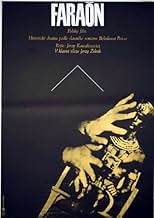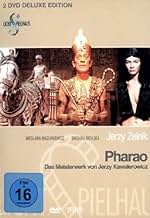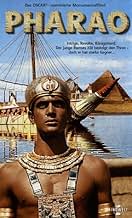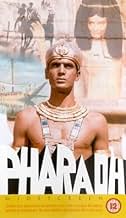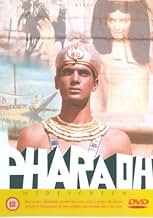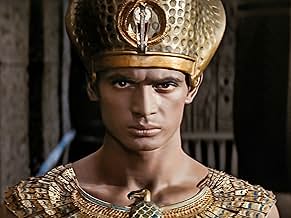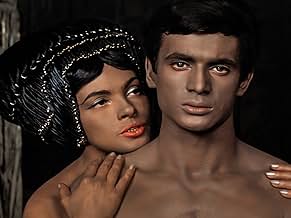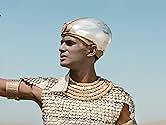IMDb RATING
7.3/10
2.5K
YOUR RATING
Young Pharaoh Ramses XIII clashes with Egypt's clergy over influence on the affairs of the state and its coffers.Young Pharaoh Ramses XIII clashes with Egypt's clergy over influence on the affairs of the state and its coffers.Young Pharaoh Ramses XIII clashes with Egypt's clergy over influence on the affairs of the state and its coffers.
- Director
- Writers
- Stars
- Nominated for 1 Oscar
- 1 win & 2 nominations total
Barbara Brylska
- Kama - Priestess of Astharte
- (as Barbara Bryl)
Emir Buczacki
- Tutmosis - Ramses XIII's Friend
- (as Jerzy Buczacki)
Jerzy Block
- Fellah opening the channel
- (as Jerzy Blok)
- Director
- Writers
- All cast & crew
- Production, box office & more at IMDbPro
Featured reviews
a subtle, bitter, cruel, cold story about the power. admirable adaptation of one of the important Polish novels of XIX century. and support of reflection about force of decisions and the value of good intentions. short, a great fascinating work. who impress not only for acting or costumes, fights and tension but for the realistic rebuild of an Egypt who becomes more than historical lesson. its grace, its terrible force of image and dialog, the new sense of a language who is perfect cloth for the story are virtues of a film who remains, almost half century, fascinating. and useful for understand history as a strange vehicle.
an important Polish novel. a special film, precise adaptation of the first. and atmosphere of an old empire. short - a kind of parable about power, illusion and generous plans. after decades, its basic force source is the delicacy of details and performances. the slow images, the links between politic and religion, economy and need of change, the supremacy of a group against the king will , the fragility of a young leader and the fall of each great state. the music, the images and the hard work to create a remarkable film. the emotions and the spirit of lost world. more than adaptation of Prus masterpiece, it is reflection of profound roots of each period. and that fact does it not only a form of history lesson but a seed for reflection about present.
It is a tale about power and politics and it is close to the Greek tragedy where there is no right choice. It is about Religion and about State - but there are no references to the history of Poland and the particular relation of Catholic Church and the Polish State. Please do not force it into a shape that it does not fit at all.
And by the way the characterization of the priests as corrupt is a misunderstanding - this is only how the immature and rather shortsighted main character sees them.
I have seen that film many times, since it is replayed quite often by the public TV here, I loved it's style since the first time - but I regarded it as a rather boring. It's only recently that I've found interest in it's main subject and that changed my attitude.
And by the way the characterization of the priests as corrupt is a misunderstanding - this is only how the immature and rather shortsighted main character sees them.
I have seen that film many times, since it is replayed quite often by the public TV here, I loved it's style since the first time - but I regarded it as a rather boring. It's only recently that I've found interest in it's main subject and that changed my attitude.
Polish director Jerzy Kawalerowicz's long gestated film adaptation of Bolesław Prus' historical novel PHARAOH is an ambitious endeavor, dazzles in its epic scale and formalist gravitas with an exclusive Polish cast, which leads to one prescribed proviso: for purists, it is beggar belief to watch a movie about ancient Egyptians where everyone sports Polish through and through; but other than that, the film is a marvel orchestrated with vigor, mettle and pathos.
The story centers around the story of an apocryphal pharaoh Ramses XIII (a 20-year-old Zelnik graced with haughty handsomeness and solemness), whose hellbent effort to seize power and pecuniary autonomy over an ever-increasingly theocratic clutches of the clergy in the Ancient Egypt.
The movie opens with a static close-up of two scarabs, competing for their trophy, then reveals a throng of Egyptian soldiers marching in an expansive desert, and directly points out the strife between the young Ramses XIII and the High Priest Herhor (Pawlowski), in order to show reverence to the sacred scarabs, Herhor commands the troops to take a devious route which causes damage to the newly-built water channels, and a resultant suicide of the channel digger. The incident enrages Ramses XIII, and he vows to take down the clergy when he assumes the regalia.
That day would not be too long in waiting, but what also awaits him is an Egypt sapping in wealth and sway, the priests arrange unfavorable treaties with the neighboring Assyrians in order to keep warfare at bay, which ostensibly seems like a well-intentioned strategy to save the hoi polloi from the scourge of war, but the truth is, there is large amount of gold and other fortunes being squirreled away in the labyrinth of the priests' temple, nominally can be only appropriated when in exigency, which the High Priests would never grant in favor of feathering their own nests. This is the touch paper which Ramses XIII deploys to foment the masses against the clergy, in an attempt to take the latter down once for all. Sadly he is still wet in his ears, and the priests are not ready to back down without a fight.
As a historical saga, PHARAOH is unusually lean on action pieces and subdued in its chromatic approach, one could imagine if the story were to be transposed as a Hollywood tent-pole in a post- BEN-HUR (1959) era, all the glittering and grandiose would suffuse its majestic set, and battleground bedlam pumped up by polished fighting competence. Here, in a much less ostentatious and more internalized style (costumes are astonishingly designed in its originally exotic verisimilitude), what comes about is a tragic tale of one young man's over-confidence in his prowess against something far more sinister, deceptive and ruthless than he has ever imagined, with a sideswipe to the benighted mob, when an eclipse crops up, all hell broke loose and burrowing a hole in the ground is their knee-jerking reaction.
Performance-wise, the cast rounds out a mostly po-faced dourness even for those who are laughing in the end (with Pawlowski emanating the highest voltage), sometimes emotes a ghost of urgency but none-too ravishing to be brutally frank. Yet, it is Kawalerowicz's arduous effort to minutely visualize a mythical epoch when primitivity and obtuseness overlay the world, yet through a tall-tale where a spate of human frailties abound and speak volumes of what one can assimilate into today's circumstances, it galvanizes new audience with its ritualistic posture and beguiling aesthetic attributes.
The story centers around the story of an apocryphal pharaoh Ramses XIII (a 20-year-old Zelnik graced with haughty handsomeness and solemness), whose hellbent effort to seize power and pecuniary autonomy over an ever-increasingly theocratic clutches of the clergy in the Ancient Egypt.
The movie opens with a static close-up of two scarabs, competing for their trophy, then reveals a throng of Egyptian soldiers marching in an expansive desert, and directly points out the strife between the young Ramses XIII and the High Priest Herhor (Pawlowski), in order to show reverence to the sacred scarabs, Herhor commands the troops to take a devious route which causes damage to the newly-built water channels, and a resultant suicide of the channel digger. The incident enrages Ramses XIII, and he vows to take down the clergy when he assumes the regalia.
That day would not be too long in waiting, but what also awaits him is an Egypt sapping in wealth and sway, the priests arrange unfavorable treaties with the neighboring Assyrians in order to keep warfare at bay, which ostensibly seems like a well-intentioned strategy to save the hoi polloi from the scourge of war, but the truth is, there is large amount of gold and other fortunes being squirreled away in the labyrinth of the priests' temple, nominally can be only appropriated when in exigency, which the High Priests would never grant in favor of feathering their own nests. This is the touch paper which Ramses XIII deploys to foment the masses against the clergy, in an attempt to take the latter down once for all. Sadly he is still wet in his ears, and the priests are not ready to back down without a fight.
As a historical saga, PHARAOH is unusually lean on action pieces and subdued in its chromatic approach, one could imagine if the story were to be transposed as a Hollywood tent-pole in a post- BEN-HUR (1959) era, all the glittering and grandiose would suffuse its majestic set, and battleground bedlam pumped up by polished fighting competence. Here, in a much less ostentatious and more internalized style (costumes are astonishingly designed in its originally exotic verisimilitude), what comes about is a tragic tale of one young man's over-confidence in his prowess against something far more sinister, deceptive and ruthless than he has ever imagined, with a sideswipe to the benighted mob, when an eclipse crops up, all hell broke loose and burrowing a hole in the ground is their knee-jerking reaction.
Performance-wise, the cast rounds out a mostly po-faced dourness even for those who are laughing in the end (with Pawlowski emanating the highest voltage), sometimes emotes a ghost of urgency but none-too ravishing to be brutally frank. Yet, it is Kawalerowicz's arduous effort to minutely visualize a mythical epoch when primitivity and obtuseness overlay the world, yet through a tall-tale where a spate of human frailties abound and speak volumes of what one can assimilate into today's circumstances, it galvanizes new audience with its ritualistic posture and beguiling aesthetic attributes.
This film is a lovingly rendered meditation on the dissolution of an ancient dynasty. The slow and stately pace matches centuries of the oppressive weight of ossified tradition bearing down on a dying culture, symbolized by the dead stone colossi and gargantuan architecture. There are moments of great beauty realized in its passing, such as the lovely sequence of fowling from a punt in the marshes, and the opening scene of divination on the battlefield by means of observing the movements of the sacred scarab dung beetles. Without a doubt, the most convincing depiction of those fascinating past people to date on the screen
Did you know
- TriviaPharaoh Ramses XIII is a fictional character. While the name Ramses/Ramesses was relatively common for Pharaohs of the 19th and and 20th Dynasties, there were only 11 historical Pharaohs of that name. Two of them were members of the 19th dynasty, and nine of them were members of the 20th dynasty.
- ConnectionsReferenced in Natchnij mnie wiara (1994)
- How long is Pharaoh?Powered by Alexa
Details
- Runtime2 hours 31 minutes
- Color
- Sound mix
- Aspect ratio
- 2.35 : 1
Contribute to this page
Suggest an edit or add missing content


